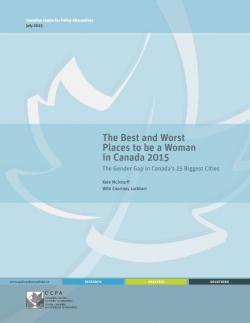This is an archive of news stories and research from the National Union of Public and General Employees. Please see our new site - https://nupge.ca - for the most current information.
Study ranks Canada’s 25 largest metropolitan areas based on a comparison of how men and women are faring in five areas: economic security, leadership, health, personal security, and education.
 Ottawa (15 July 2015) — A new study released today by the Canadian Centre for Policy Alternatives (CCPA) reveals the best and worst cities to be a woman in Canada. According to the study, Victoria is the best city to be a woman and Kitchener-Cambridge-Waterloo is the worst.
Ottawa (15 July 2015) — A new study released today by the Canadian Centre for Policy Alternatives (CCPA) reveals the best and worst cities to be a woman in Canada. According to the study, Victoria is the best city to be a woman and Kitchener-Cambridge-Waterloo is the worst.
An annual measure of the gender gap
The study, by CCPA Senior Researcher Kate McInturff, ranks Canada's 25 largest metropolitan areas based on a comparison of how men and women are faring in five areas: economic security, leadership, health, personal security, and education.
It is intended to provide an annual measure of the gaps that exist between men and women in communities across Canada and serve as a reminder that, with the right choices and policies, these gaps can be closed.
Eye-opening conclusions
"The reality is Canada has a gender gap. When it comes to pay, jobs, and safety, men and women still don't get equal treatment in Canada," says McInturff. "We need to take stock of the gaps so we can close them."
Among the study's findings
- Cities in Québec fare better than cities in other provinces, with Gatineau, Québec City, and Montréal ranking in the top 10, thanks to provincial policies that address the specific challenges women face in balancing work and family life.
- Cities with a large public sector employer, like Victoria and Gatineau, also come out on top—particularly in narrowing the wage gap and in promoting women into senior management positions.
- Women in Gatineau see the smallest gap in their pay, earning 87¢ on the male dollar.
- Women in Victoria come the closest to having the same level of employment as men, trailing them by a mere 3%.
- Regions that depend on predominantly male industries tend to land at the bottom of the list, with Calgary, Edmonton and Kitchener-Cambridge-Waterloo taking up the bottom three spots.
- Prairie cities Winnipeg and Saskatoon, as well as Eastern cities Halifax and St. John's, boast some of the smallest gaps in health.
- Ottawa has the most university graduates and women in Oshawa are the most likely to have completed a college degree.
- Rates of sexual assault, harassment, and intimate partner violence remain persistently high in Canada, changing little over the past 20 years.
Examples of positive programs and policies already in place
The study includes examples of local initiatives underway in each city to help close the gender gap, from a group of food servers in Edmonton who got tired of being asked to wear miniskirts at work, to an organization in Québec City that ensures that Deaf women have access to perinatal care.
"This isn't rocket science. There are solutions to gender inequality and you can find them in communities across Canada," says McInturff. "Looking at which city fares the worst and best in terms of gender equality isn't about winning the cup, it's about identifying what works in one community and bringing it home to another—so that every city in Canada is a good place to be a woman."
More information:
The Best and Worst Places to Be a Woman in Canada 2015
NUPGE
The National Union of Public and General Employees (NUPGE) is one of Canada's largest labour organizations with over 360,000 members. Our mission is to improve the lives of working families and to build a stronger Canada by ensuring our common wealth is used for the common good. NUPGE
